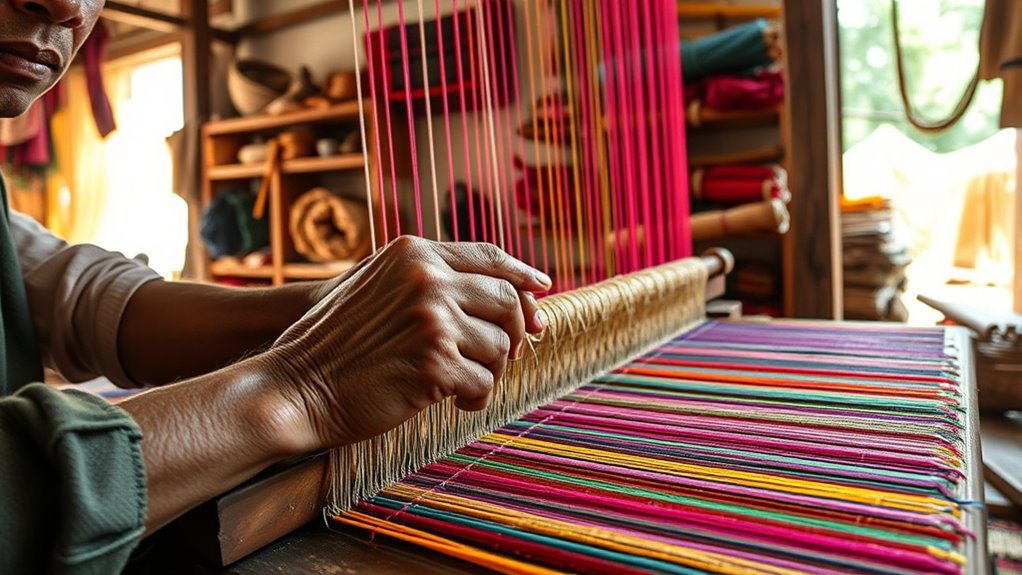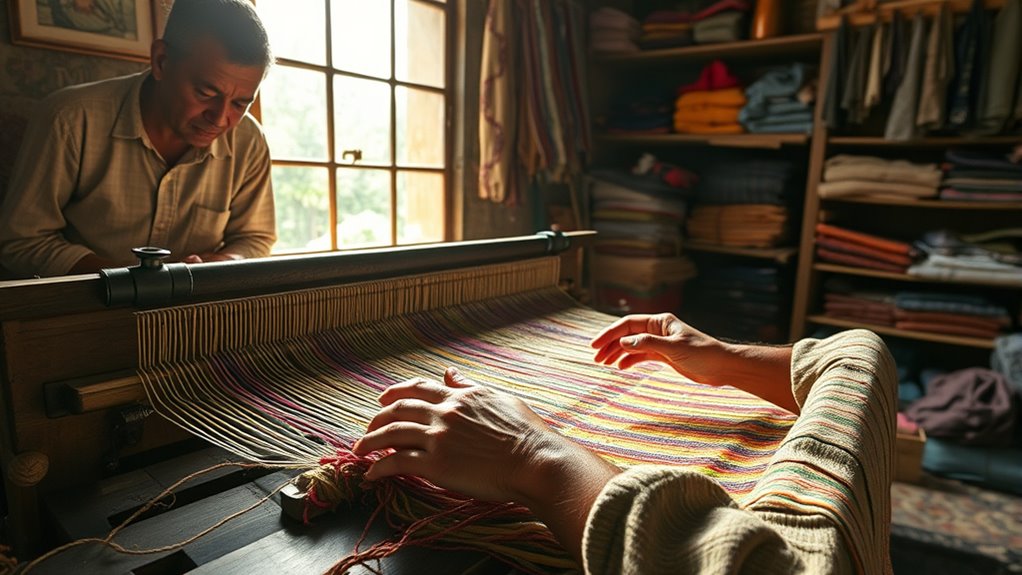In the global supply chain, your support can make a difference in protecting artisans’ rights. Complex networks often undervalue craftsmanship, threaten cultural meaning, and make it harder for artisans to safeguard their designs. By choosing fair trade and ethically sourced products, advocating for stronger intellectual property protections, and supporting organizations that champion artisans, you help guarantee fair compensation and preserve traditional techniques. If you want to learn how your choices impact global artisan communities, keep exploring this important issue.
Key Takeaways
- Global supply chains often undervalue artisans’ craftsmanship, risking loss of cultural significance and unique skills.
- Protecting artisans’ intellectual property rights ensures they profit from their original designs and cultural expressions.
- Fair trade standards promote recognition, respect, and fair compensation for artisan communities within global markets.
- Consumer advocacy and ethical sourcing support stronger IP protections and fair licensing practices for artisans.
- Collaborative efforts among consumers, brands, and organizations help sustain artisan rights and preserve cultural heritage.

As global supply chains expand, artisans often find their craftsmanship undervalued and their rights overlooked. When products move through complex networks of manufacturing, distribution, and retail, it’s easy for the unique skills and cultural significance behind artisans’ work to get lost. That’s where Fair Trade initiatives come into play, aiming to guarantee artisans receive fair compensation and work under ethical conditions. These programs also emphasize transparency, empowering artisans to retain control over their creations and benefit directly from their labor. By supporting Fair Trade, you help create a more equitable marketplace where artisans aren’t just suppliers but recognized creators whose rights are protected.
One of the challenges artisans face in the global market is safeguarding their intellectual property. When their designs, patterns, or techniques are copied or stolen without permission, it not only diminishes their economic value but also erodes their cultural identity. Protecting intellectual property rights is vital in navigating artisans can profit from their originality and maintain the integrity of their work. However, managing these protections can be tricky across different countries, especially when enforcement varies. As a consumer or business, you play a role in advocating for stronger legal frameworks and supporting initiatives that help artisans enforce their rights internationally. This might include working with organizations that specialize in intellectual property rights or choosing brands committed to ethical sourcing and fair licensing practices.
Moreover, the commodification of artisan products often strips away their cultural significance, reducing them to mere commodities. To counter this, fair trade standards encourage consumers and brands to recognize and respect the cultural origins of these crafts. When you buy artisan products that adhere to fair trade principles, you’re not just purchasing a handcrafted item; you’re supporting a community’s heritage and helping sustain traditional techniques. This also means respecting the artisans’ rights to control how their designs are used and shared, preventing unauthorized reproduction that could diminish their cultural value.
Ultimately, protecting artisan rights within the global supply chain requires a collective effort. As a conscious consumer, you can demand transparency and ethical practices from brands and retailers. By prioritizing fair trade-certified products and advocating for stronger intellectual property protections, you help guarantee artisans are respected, fairly compensated, and empowered to continue their craft. Their skills and cultural expressions deserve recognition, and your choices can make a real difference in fostering a more just and sustainable global marketplace.
Frequently Asked Questions
How Do Artisan Rights Vary Across Different Countries?
You’ll find that artisan rights vary across countries, often influenced by local laws and cultural values. In some places, governments protect traditional craftsmanship and cultural preservation, giving artisans legal rights and support. In others, lack of regulation may leave artisans vulnerable to exploitation. Recognizing these differences helps you appreciate how cultural preservation shapes artisan rights, ensuring traditional craftsmanship survives and thrives in diverse regions worldwide.
What Legal Protections Exist for Artisans Globally?
You’re protected by various legal protections like intellectual property laws and trade regulations, which act as shields for your craftsmanship. These laws safeguard your designs, patterns, and unique techniques from infringement worldwide. In some countries, artisans benefit from strict enforcement, while others are still developing robust protections. By understanding these legal frameworks, you can better defend your work and ensure your artistry remains yours, shining brightly in the global marketplace.
How Can Consumers Ensure Ethical Sourcing of Artisan Products?
You can guarantee ethical sourcing of artisan products by choosing items that meet Fair Trade certification standards. Look for trusted certification labels to verify fair wages, safe working conditions, and sustainable practices. Research brands’ transparency and commitment to ethical practices. Supporting Fair Trade-certified products helps you promote artisans’ rights, ensuring they receive fair compensation and work in humane environments, making your purchase both stylish and socially responsible.
What Role Do International Organizations Play in Safeguarding Artisan Rights?
Think of international organizations as guardians of artisan rights, championing Fair Trade and Cultural Preservation. They create standards and certifications that you can trust, ensuring artisans are paid fairly and their traditions respected. By advocating for ethical practices, these organizations act like a lighthouse guiding consumers toward responsible choices. Your support helps uphold artisans’ livelihoods, preserving craftsmanship and culture for generations to come.
How Are Digital Platforms Impacting Artisan Access to Markets?
Digital marketplaces and e-commerce platforms profoundly boost your access to markets by connecting you directly with a global audience. You can showcase your crafts, reach new customers, and sell without intermediaries. These platforms offer tools to manage orders, marketing, and payments easily. By using digital marketplaces, you gain visibility and increase sales opportunities, empowering you to grow your artisan business and preserve traditional skills in the modern digital economy.
Conclusion
By standing up for artisan rights, you help weave a tapestry of fairness across the global supply chain. Every act of support adds a vibrant thread, turning a tangled web of exploitation into a masterpiece of dignity and respect. When you champion these craftspeople, you become a guardian of their stories and skills, ensuring their voices echo through the marketplace. Together, we can transform the flow of commerce into a river of hope and empowerment.










